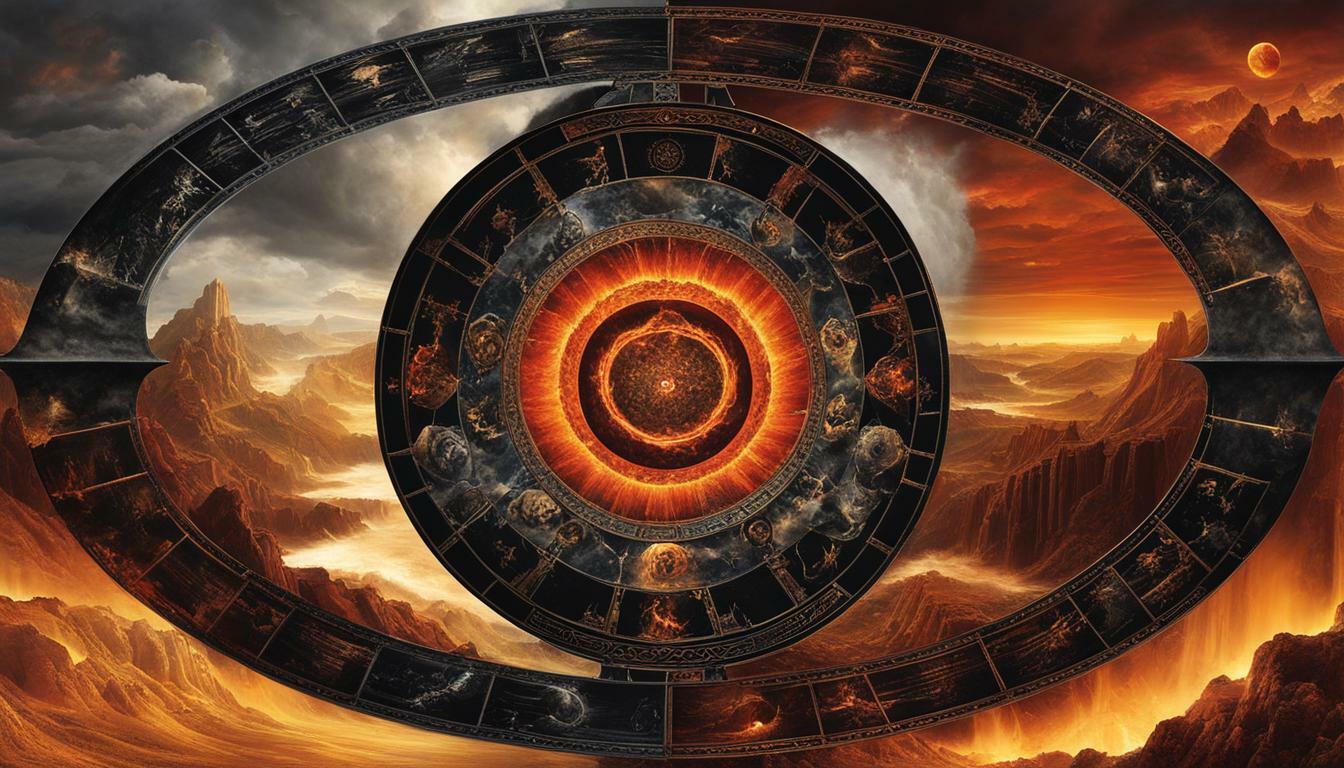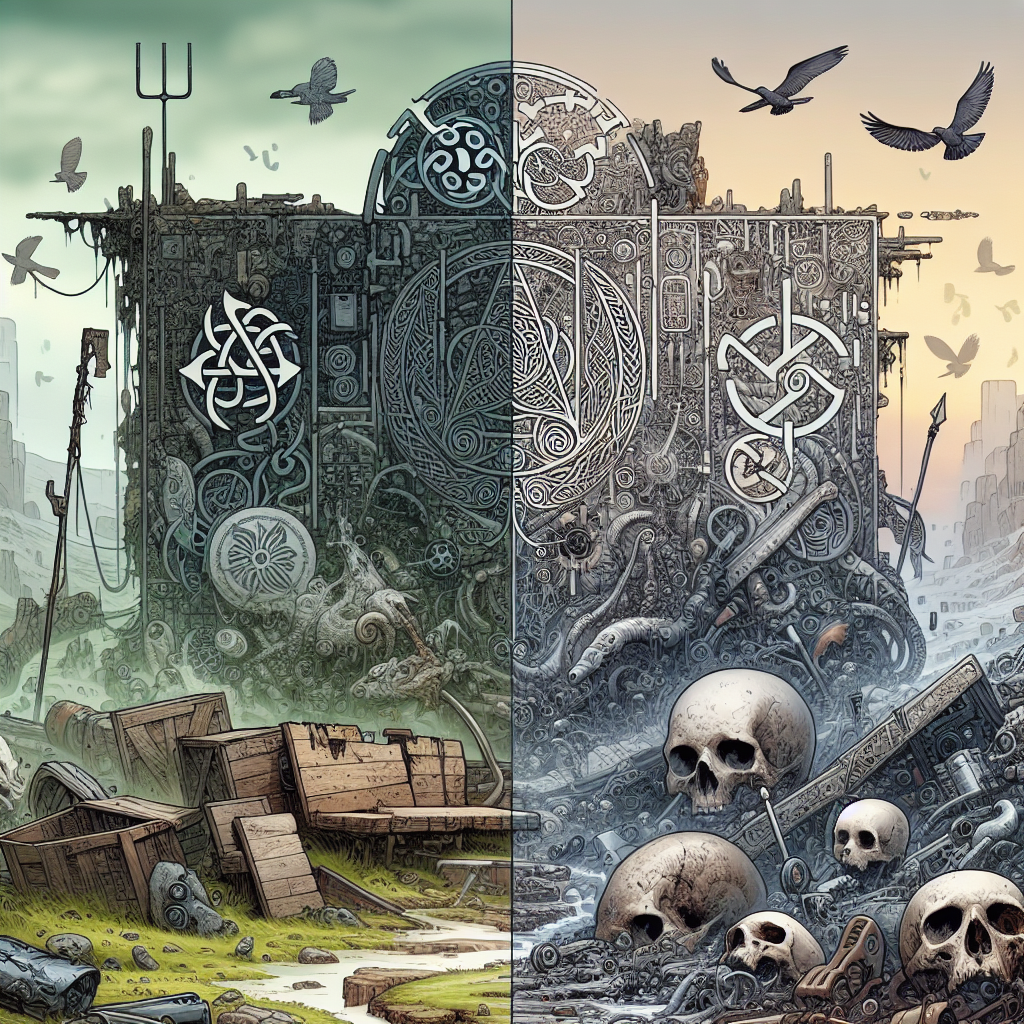In various spiritual beliefs, the concept of the karmic cycle and eternal damnation holds significant importance. While both deal with the consequences of actions, their underlying principles and origins are distinct.
The karmic cycle is a belief that one’s actions during this life determine the nature of their rebirth. This cycle is based on the principle of cause and effect, where good deeds lead to positive consequences and evil deeds lead to negative ones. In contrast, eternal damnation is a concept that concerns the afterlife and punishments for one’s actions in this life. It is a belief that the wicked will be punished eternally in the afterlife.
These concepts are closely tied to spiritual beliefs, reincarnation beliefs, karmic law, and religious doctrines. Understanding the differences between them can provide a better understanding of various belief systems and their perspective on the consequences of actions and the afterlife.
Key Takeaways
- The karmic cycle and eternal damnation are two different concepts that deal with the consequences of actions.
- The karmic cycle is based on the principle of cause and effect, where good deeds lead to positive consequences and evil deeds lead to negative ones.
- Eternal damnation is the belief that the wicked will be punished eternally in the afterlife.
- Both concepts are closely tied to spiritual beliefs, reincarnation beliefs, karmic law, and religious doctrines.
The Karmic Cycle: Rebirth and Salvation
The karmic cycle is a fundamental concept in various spiritual beliefs, including Hinduism, Buddhism, Jainism, and Sikhism. At its core, the karmic cycle refers to the idea that an individual’s actions, intentions, and thoughts create a sort of spiritual energy that will influence their future experiences.
Many spiritual beliefs that follow the karmic cycle also subscribe to the idea of reincarnation. Reincarnation beliefs state that after death, an individual’s consciousness will be reborn into a new physical body. The type of body and experiences that an individual is reborn into is determined by their karma or the consequences of their actions in previous lives.
The karmic cycle places a strong emphasis on the idea of consequences. The belief is that every action has a reaction, and individuals will experience the effects of their actions in this life or future lives. Understanding this cycle of cause and effect is seen as a path to achieving salvation or liberation from the cycle of birth and rebirth.
There is a distinction between achieving salvation through rebirth in the karmic cycle and the concept of salvation in certain religious doctrines. In karmic beliefs, salvation is achieved through breaking the cycle of birth and rebirth. In contrast, certain religious doctrines emphasize achieving salvation through faith, acceptance of a higher power, or adherence to religious laws.
Karmic beliefs offer a unique perspective on the consequences of actions and the concept of salvation. They emphasize the role of personal responsibility and the power of an individual’s actions to shape their future experiences. However, they differ in significant ways from many religious doctrines that emphasize faith, morals, and obedience to a higher power.
Eternal Damnation: Judgment and Punishment
Many religious doctrines depict the concept of eternal damnation as a form of punishment for individuals who have committed sins or wrongdoings during their lifetime. According to these beliefs, the afterlife is determined by judgment, where souls are separated into either eternal paradise or eternal hell. The concept of eternal damnation is prevalent in Christianity, where it is described as separation from God.
In Christianity, the idea of judgment is associated with the concept of the Last Judgment, where God judges all souls at the end of time. Those who have lived a life in accordance with God’s will are rewarded with eternal life in paradise with Him. However, those who have committed sins and rejected God’s salvation are condemned to eternal damnation in hell.
Judaism also depicts the idea of judgment in the afterlife. According to Jewish beliefs, the soul is judged based on the actions performed during one’s lifetime, with the righteous souls being rewarded with eternal life in paradise, while the wicked souls are condemned to eternal punishment in hell.
Islam shares similar beliefs on the concept of judgment and punishment in the afterlife. Muslims believe that the souls will be judged based on their deeds in life, with the righteous souls receiving eternal paradise, while the wicked souls face punishment in hell.
Eternal damnation serves as a warning to individuals to live a life free of sins and to follow the teachings of their respective religions. The consequences of actions during one’s lifetime play a significant role in determining the afterlife. Therefore, religious doctrines emphasize the importance of leading a life in accordance with the teachings and beliefs of the religion to avoid eternal punishment.
Overall, eternal damnation is a critical concept in many religious doctrines. The idea of judgment and punishment in the afterlife serves as a motivation to live a life free of sins and to strive for righteousness and salvation.
Comparing the Karmic Cycle and Eternal Damnation
While both the karmic cycle and eternal damnation deal with the consequences of actions, they originate from entirely different spiritual beliefs and religious doctrines. The karmic cycle is rooted in Eastern spiritual beliefs, specifically reincarnation beliefs, where the consequences of actions are thought to play a significant role in an individual’s future rebirth. On the other hand, eternal damnation is primarily associated with Western religious doctrines, where the consequences of actions are believed to determine an individual’s fate in the afterlife.
In the karmic cycle, the ultimate goal is to achieve enlightenment or liberation from the cycle of rebirth by acting in accordance with the karmic law. The karmic law dictates that every action has an equal and opposite reaction and creates a cycle of cause and effect that governs an individual’s rebirth. This cycle continues until the individual achieves enlightenment, breaks free from the cycle of rebirth and attains salvation.
Conversely, in eternal damnation, the focus is on judgment and punishment for one’s actions in life. The consequences of one’s actions are believed to determine whether they will spend eternity in heaven or hell. Those who have lived a good life are rewarded with eternal happiness in heaven, while those who have committed sins are punished with eternal suffering in hell.
While the karmic cycle and eternal damnation share some similarities in their emphasis on the consequences of actions, their underlying principles differ significantly. The karmic cycle emphasizes personal responsibility and the power of individual actions to shape one’s future, while eternal damnation emphasizes the importance of strict adherence to religious doctrines to ensure an afterlife free from punishment and suffering.
Ultimately, the differences between the karmic cycle and eternal damnation reflect the diverse spiritual beliefs and religious doctrines found throughout the world. Understanding these differences can help individuals gain a broader perspective on various spiritual paths and their respective views on the consequences of actions and the afterlife.
Conclusion
As we have seen, the karmic cycle and eternal damnation are two distinct spiritual concepts that have different origins and beliefs associated with them. While the karmic cycle is based on the idea of rebirth and achieving salvation through one’s actions, eternal damnation is tied to religious doctrines that speak of judgment and punishment in the afterlife.
By understanding the difference between these two concepts, we can gain a broader perspective on how different spiritual beliefs shape individuals’ views on life and the afterlife. It is up to individuals to choose their paths and beliefs, and it is important to respect and understand diverse perspectives and traditions.
Final Thoughts
It is essential to recognize that the karmic cycle and eternal damnation are not the only spiritual concepts that exist, and there are numerous beliefs and practices that have shaped the world’s spiritual landscape. Whether one believes in the karmic cycle or eternal damnation, it is important to lead a life that is in harmony with one’s values and principles.
Ultimately, whatever one’s beliefs, treating others with kindness, compassion, and respect is a universal principle that transcends all spiritual traditions. By embodying these principles in our lives and interactions, regardless of our beliefs, we can contribute to a more compassionate and empathic world.
FAQ
Q: What is the difference between the karmic cycle and eternal damnation?
A: The karmic cycle refers to the belief in reincarnation and the idea that our actions in this life will determine our experiences in future lives. Eternal damnation, on the other hand, is a concept found in certain religious doctrines where individuals are condemned to suffer for eternity for their sins or lack of faith.
Q: What are some spiritual beliefs associated with the karmic cycle?
A: The karmic cycle is often tied to spiritual beliefs that embrace the idea of reincarnation. It suggests that our souls are reborn into different bodies and that the consequences of our actions in previous lives shape our current circumstances. The goal is to break free from the cycle by achieving spiritual growth or enlightenment.
Q: How does eternal damnation relate to religious doctrines?
A: Eternal damnation is a concept found in various religious doctrines, particularly those that emphasize judgment and punishment for sinful behavior. It is believed that those who do not adhere to specific religious principles or fail to seek forgiveness are destined to suffer eternal torment in the afterlife.
Q: Can the karmic cycle and eternal damnation coexist in a person’s beliefs?
A: It is possible for individuals to hold beliefs in both the karmic cycle and eternal damnation, although they may originate from different spiritual or religious traditions. However, these concepts may present conflicting views on the consequences of actions and the nature of the afterlife, requiring individuals to reconcile or prioritize their beliefs.
Q: How do the karmic cycle and eternal damnation shape our perspectives on life and the afterlife?
A: The karmic cycle encourages individuals to take responsibility for their actions and strive for personal growth and enlightenment. It emphasizes the potential for transformation and the possibility of multiple lives to achieve spiritual liberation. On the other hand, eternal damnation can instill fear and a sense of divine judgment, influencing beliefs about morality and the consequences of one’s choices.
 Skip to main content
Skip to main content


